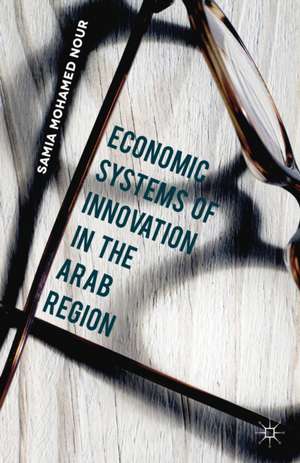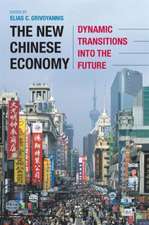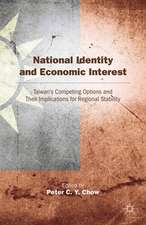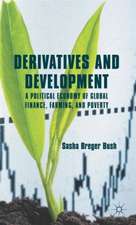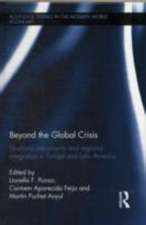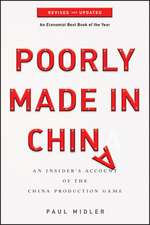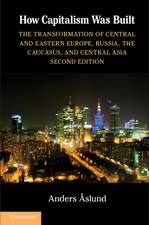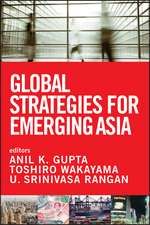Economic Systems of Innovation in the Arab Region
Autor Samia Mohamed Nouren Limba Engleză Hardback – 27 feb 2016
| Toate formatele și edițiile | Preț | Express |
|---|---|---|
| Paperback (1) | 642.51 lei 43-57 zile | |
| Palgrave Macmillan US – 9 iun 2016 | 642.51 lei 43-57 zile | |
| Hardback (1) | 648.89 lei 43-57 zile | |
| Palgrave Macmillan US – 27 feb 2016 | 648.89 lei 43-57 zile |
Preț: 648.89 lei
Preț vechi: 763.40 lei
-15% Nou
Puncte Express: 973
Preț estimativ în valută:
124.20€ • 134.96$ • 104.40£
124.20€ • 134.96$ • 104.40£
Carte tipărită la comandă
Livrare economică 21 aprilie-05 mai
Preluare comenzi: 021 569.72.76
Specificații
ISBN-13: 9781137462992
ISBN-10: 113746299X
Pagini: 309
Ilustrații: XXX, 309 p.
Dimensiuni: 155 x 235 x 21 mm
Greutate: 0.65 kg
Ediția:1st ed. 2015
Editura: Palgrave Macmillan US
Colecția Palgrave Macmillan
Locul publicării:New York, United States
ISBN-10: 113746299X
Pagini: 309
Ilustrații: XXX, 309 p.
Dimensiuni: 155 x 235 x 21 mm
Greutate: 0.65 kg
Ediția:1st ed. 2015
Editura: Palgrave Macmillan US
Colecția Palgrave Macmillan
Locul publicării:New York, United States
Cuprins
1. General Introduction
2. Economic Development Challenges in the Arab Region and the Need for Promoting the Systems of Innovation
3. Conceptual Framework and Literature Review
4. Overview of National Systems of Innovation in the Arab Countries
5. Overview of Regional Systems of Innovation in the Arab Region
6. Implications of poor systems of innovation in the Arab region
7. Summary and Conclusions
2. Economic Development Challenges in the Arab Region and the Need for Promoting the Systems of Innovation
3. Conceptual Framework and Literature Review
4. Overview of National Systems of Innovation in the Arab Countries
5. Overview of Regional Systems of Innovation in the Arab Region
6. Implications of poor systems of innovation in the Arab region
7. Summary and Conclusions
Recenzii
"Mohamed Nour provides a very nice comprehensive and detailed account of the national systems of innovation in the Arab Region. She carefully identifies the impediments posed by the rent sharing nature of natural resource-based economies. The emphasis on proper institutional settings as a requirement for innovation and the systematic comparative study of (the lack of) these settings in the Arab region leads to a challenging analysis and also provides clear policy recommendations." - Joan Muysken, Professor Emeritus, Department of Economics, School of Business and Economics, Maastricht University, The Netherlands
"This book is of great value for all those who think that deep reforms are needed in the Arab Region in order to realize inclusive growth. It becomes quite clear that inclusive growth cannot be reached without reforms of the national innovation systems, and that these reforms are interrelated with comprehensive socio-economic reforms. Key subsystems of the national innovation systems and the respective institutions are carefully identified for the Arab countries and analyzed in context. Policymakers in Arab countries and all those working on the region need to study the book carefully. It contains a wealth of information for the move towards a knowledge society in the Arab region. The subsystems (education, higher education, and training; science and technology and research and development; and ICT) are excellently brought into connection with the economic structures and policies prevailing in the Arab region." - Karl Wohlmuth, Professor Emeritus and Director of the Research Group on African Development Perspectives, University of Bremen, Germany
"Triggered by the desolate prospects for social and economic security, the Arab region is going through a period of dramatic change. One of the region's economic challenges will be to transform its rentier system into an economic system of innovation that fosters the development of added value chains and productive sectors with job prospects and social inclusion for its - mainly youth - population. Mohamed Nour's book provides an insightful analysis of the characteristics, constraints, and policy options for Arab countries to transition towards internationally competitive and inclusive economies, and how innovation and technology and knowledge transfer play a crucial role." - Jacques van der Meer, Managerial Advisor, Projects Directorate, Department of Innovation and Competitiveness, European Investment Bank, Luxembourg
"This book is of great value for all those who think that deep reforms are needed in the Arab Region in order to realize inclusive growth. It becomes quite clear that inclusive growth cannot be reached without reforms of the national innovation systems, and that these reforms are interrelated with comprehensive socio-economic reforms. Key subsystems of the national innovation systems and the respective institutions are carefully identified for the Arab countries and analyzed in context. Policymakers in Arab countries and all those working on the region need to study the book carefully. It contains a wealth of information for the move towards a knowledge society in the Arab region. The subsystems (education, higher education, and training; science and technology and research and development; and ICT) are excellently brought into connection with the economic structures and policies prevailing in the Arab region." - Karl Wohlmuth, Professor Emeritus and Director of the Research Group on African Development Perspectives, University of Bremen, Germany
"Triggered by the desolate prospects for social and economic security, the Arab region is going through a period of dramatic change. One of the region's economic challenges will be to transform its rentier system into an economic system of innovation that fosters the development of added value chains and productive sectors with job prospects and social inclusion for its - mainly youth - population. Mohamed Nour's book provides an insightful analysis of the characteristics, constraints, and policy options for Arab countries to transition towards internationally competitive and inclusive economies, and how innovation and technology and knowledge transfer play a crucial role." - Jacques van der Meer, Managerial Advisor, Projects Directorate, Department of Innovation and Competitiveness, European Investment Bank, Luxembourg
Notă biografică
Dr. Samia Satti Osman Mohamed Nour is Affiliated Researcher at United Nations University - Maastricht Economic and Social Research Institute on Innovation and Technology (UNU-MERIT), Netherlands, and Associate Professor of Economics at Khartoum University, Sudan. She received her PhD in Economics from Maastricht University (Netherlands) in 2005. She is the author of Technological Change and Skill Development in Sudan (2013), Technological Change and Skill Development in Arab Gulf Countries (2013), and Information and Communication Technology in Sudan (2015), and co-author of the Arab States Chapter of the UNESCO Science Report (2015). Dr. Nour has worked as Economic Consultant for international institutions such as the European Investment Bank (EIB), ILO, OECD, UNDP, UNFPA and UNECA. She was a member of the advisory committee for the UNDP Third Arab Knowledge Report 2014. She received the Arab Fund for Economic and Social Development Distinguished Scholar Award and Post Doctoral Fellowship (2010-2011) and the University of Khartoum Scientific Excellence Award Prize in Humanities and Educational Studies (in the field of Economics) (2013).
Textul de pe ultima copertă
The Arab region has become a hotbed of economic growth in recent decades. While this growth has indisputably brought in wealth, there are still countless questions about the characteristics, constraints, and implications of the region's systems of innovation. Do these systems even exist in the Arab region? How does the current economic structure affect regional innovation? Is the presence of natural resources a help or a hindrance? Economic Systems of Innovation in the Arab Region discusses the causes, consequences, and implications of poor systems of innovation in the Middle East and North Africa. By examining the comparative weakness of innovation, the economic structure, and the diversity of the region, Nour shows that the development of Arab regional systems of innovation is contingent upon the development of adequate economic policies and incentives in the area. Her contribution is key for students and scholars of economics, innovation, and international relations.
